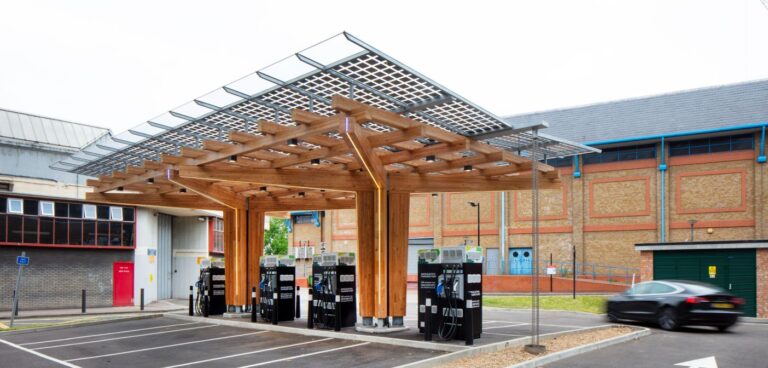Transport for London (TfL) has opened a new EV rapid charging hub at Glass Yard in Woolwich.
The Glass Yard hub is a £2m investment in collaboration with EV chargepoint operator ESB Energy and Siemens Mobility as the installation partner.
The south London facility enables drivers to charge up in 20-30 minutes via eight charging points and is part of TfL’s strategy to have a rapid charging hub in each of the capital’s five sub-regions.
The first was in east London at Stratford International and a site at Baynard House in the City of London, the central location is currently being constructed. More will follow in the north and west.
The Glass Yard hub is located on the edge of the forthcoming expanded Ultra Low Emission Zone (ULEZ) boundary, which, from 25 October, will expand up to but not include the North and South Circular roads.
Alex Williams, TfL’s director of city planning, said: “The state-of-the art facility at Glass Yard gives people confidence that they will have a chargepoint available when they arrive and not have to wait long until they are fully powered up.”
Last year, TfL reportedly hit its target of delivering 300 rapid charging points across the capital in an effort to support commercial drivers, such as taxis, private hire and van drivers, transition to EVs.
Furthermore, in partnership with the city’s 33 boroughs through the Go Ultra Low Cities scheme, more than 3,000 residential charging points have been delivered, allowing drivers to plug their vehicle in overnight.
According to TfL, there are now more than 7,000 charging points within the M25, an increase of more than 2,000 over the last year. Some are dedicated specifically to more than 4,300 zero-emission capable black cabs.
Taxi drivers have also been able to access up to £10,000 to take diesels off the road and through the Office of Low Emission Vehicles are being given a grant of £3,500 to go electric.
While the charging infrastructure installed meets current demand, TfL said a huge rise in demand is expected over the next few years as the take up of EVs increases.
Thus, mayor of London Sadiq Khan’s Electric Vehicle Infrastructure Delivery Plan estimates that by 2025, London may need up to 4,000 rapid charging points and up to 48,000 residential chargers.
A new strategy will be published later this year, addressing future forecasts. It will include analysis of long-term demand, further information on how the Greater London Authority land can be used to ramp up the density of charging points and how the public and private sector can remove barriers to their construction.
Williams said: “It’s essential that we increase the supply of charging infrastructure for electric vehicles as we support the shift to these vehicles to clean up London’s air and decarbonise transport in the city.
“We have seen an increase of more than 2,000 charging points in the capital over the last year and these new hubs are a key part of that expansion.
“These hubs will be spread across the capital and complement the dense charging network we already have, meaning range anxiety is not something drivers have to worry about in London.”





